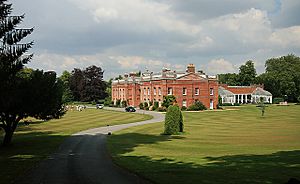George William Brydges facts for kids
George Brydges (born in 1678, died in 1751) was an important English politician. He came from a place called Avington, Hampshire. George was a member of the Whig party, which was one of the main political groups in England at the time. He served in the House of Commons for a very long time, almost 40 years! This was between 1708 and 1751. The House of Commons is where elected representatives meet to make laws for the country.
Contents
Who Was George Brydges?
George Brydges was born in July 1678. He was the only son of George Rodney Brydges and his wife Anna Maria Talbot, Countess of Shrewsbury. His family was well-known and had important connections.
His Early Life and Education
George likely went to Winchester College, a famous school, from 1686 to 1691. After school, he traveled abroad to Holland in 1696. This was a common way for young gentlemen to learn about the world.
In 1714, George inherited Avington House from his father. Later, in 1728, he also inherited property from his uncle Harry Brydges in Keynsham, Somerset.
Becoming a Member of Parliament
George Brydges decided to enter politics. He wanted to become a Member of Parliament (MP). An MP is someone elected to represent a specific area in the House of Commons.
First Election and Beyond
In 1708, George first tried to become an MP for Whitchurch. He didn't win the first vote. However, after a special review, he was declared the winner on December 21, 1708. He became a Whig MP.
He did not run for election in 1710. In 1712, he married Anne Woolfe. Her father, Sir Joseph Woolfe, was a mercer, which means he sold fine fabrics.
When George's father passed away in 1714, George took his place as the MP for Winchester. He won a special election on March 15, 1714.
George Brydges continued to be elected as the MP for Winchester in many elections. He won in 1715, 1722, 1727, 1734, 1741, and even in 1747. This shows he was a very popular and trusted politician in his area.
His Later Years
In his old age, George Brydges became very ill and had trouble moving. He passed away on May 13, 1751. He was found in a canal in his gardens at Avington. He was buried in the local church.
George Brydges did not have any children. He left most of his estate to Henry Brydges, 2nd Duke of Chandos, a relative.
 | Tommie Smith |
 | Simone Manuel |
 | Shani Davis |
 | Simone Biles |
 | Alice Coachman |


